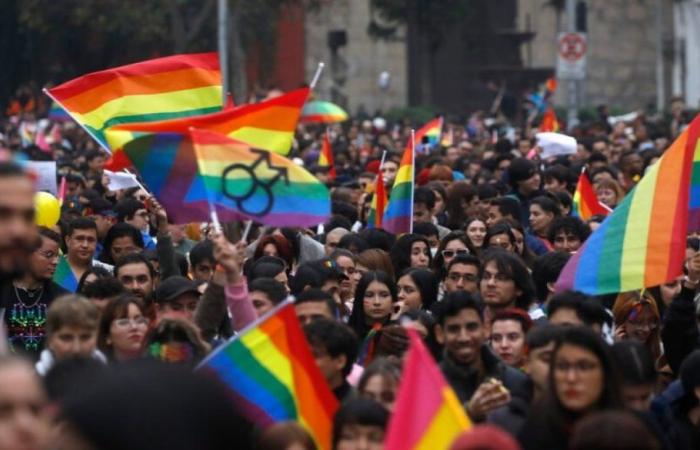Market research company Ipsos released its latest global report “LGBT+ Pride 2024”, where it surveyed more than 18,500 people in 26 countries, to learn about various aspects and trends about the LGBT+ community in Chile and the world.
Of the total number of people aged 18 and over surveyed in our country, 11% said they identified as lesbian, gay, bisexual, pansexual/omnisexual or asexual. Among adults consulted in Chile, recognition reached 12%.
In relation to the visibility of the LGTB+ community in the environments of the people consulted, in Chile, 57% indicated having a family member, friend or work colleague who identifies as lesbian/gay/homosexual, 30% know people who 16% declare transgender people bisexualandnero and 11% to non-binary people.
Regarding public visibility, half of the people (50%) consulted in our country indicatedor that companies and brands must actively promote equality for LGTB+ people, and 42% that it is necessary to have more LGBT+ public figures on television, film and advertising. Although Chile is above the global average of the 26 countries (44% and 33% respectively), these results correspond to a decline of 6 points in agreement in the promotion of equality from companies and 2 points less in visibility in the media in comparison with the 2021 measurement.
LGBT+ Attitudes and Rights
Regarding attitudes towards the LGTB+ community, 63% of the people consulted in Chile agree that people from the community speak openly about their sexual orientation, 57% support the open declaration of athletes in their respective sports branches and 47% approve of LGTB+ people showing affection in public. In all three cases, Chile is above the global averages of 50% speaking openly regarding orientation, 49% regarding athletes, and 39% regarding expressions of affection in public. However, it drops 5 and 6 points compared to 2021 in the first two indicators.
In line with the global average, seven out of ten consulted in Chile believe that LGTB+ people should be protected against discrimination in employment, housing and access to businesses such as restaurants and stores, as well as transgender peopleandnero (73% for LGTB+ people and 72% for transgender peopleandWildman)
Globally, two-thirds (66%) believe that transgender peoplenero suffer discrimination in their countries. The figure reaches 74% in Chile, occupying fifth position in the ranking of countries, afterands of Peruú (78%), Colombia (77%), Brazil (76%) and Mandxico (75%), with Latin American countries reporting the greatest observation of discriminationn transgandWildman.
Regarding the support of rights for the LGTB+ community, In Chile, 67% support adolescents having access to firming treatmentsn gender changes authorized by responsible adults, 61% support the existence of laws that prohibit discrimination (9 points less than in 2021), 60% that health insurance systems cover the costs of gender transition in the same way than the costs of other medical procedures, 59% the existence of the option “Other sex” in official documents such as the passport and 57% that transgender peopleandmen may use facilities that are intended for single sex (for example, a public bathroomwar).
However, the divisive idea is that transgender athletesandnero compete for the sex with which they identify, where support is only 37%, while 40% oppose. In addition, there are 6 points less support than in 2021.
“There is an important recognition of the visibility of the LGTB+ community in the country and the need to deepen this visibility, which is associated with massive support for the promotion of their rights. The majority recognition that it is necessary to support adolescents in reaffirmation therapiesn of gandnero and that health insurance must cover the payment of costs of treatments related to the transition of transgender peopleandnero is a significant advance, which speaks to the need to designor polYoethics ppublic and financing. However, it is still worrying that we observe setbacks in the data compared to 2021, which do not modify the majority opinion, but do express a certain fragility of the progress in the matter,” comments Alejandra Ojeda, director of Estudios Pú.Ipsos Chile’s military reports.






